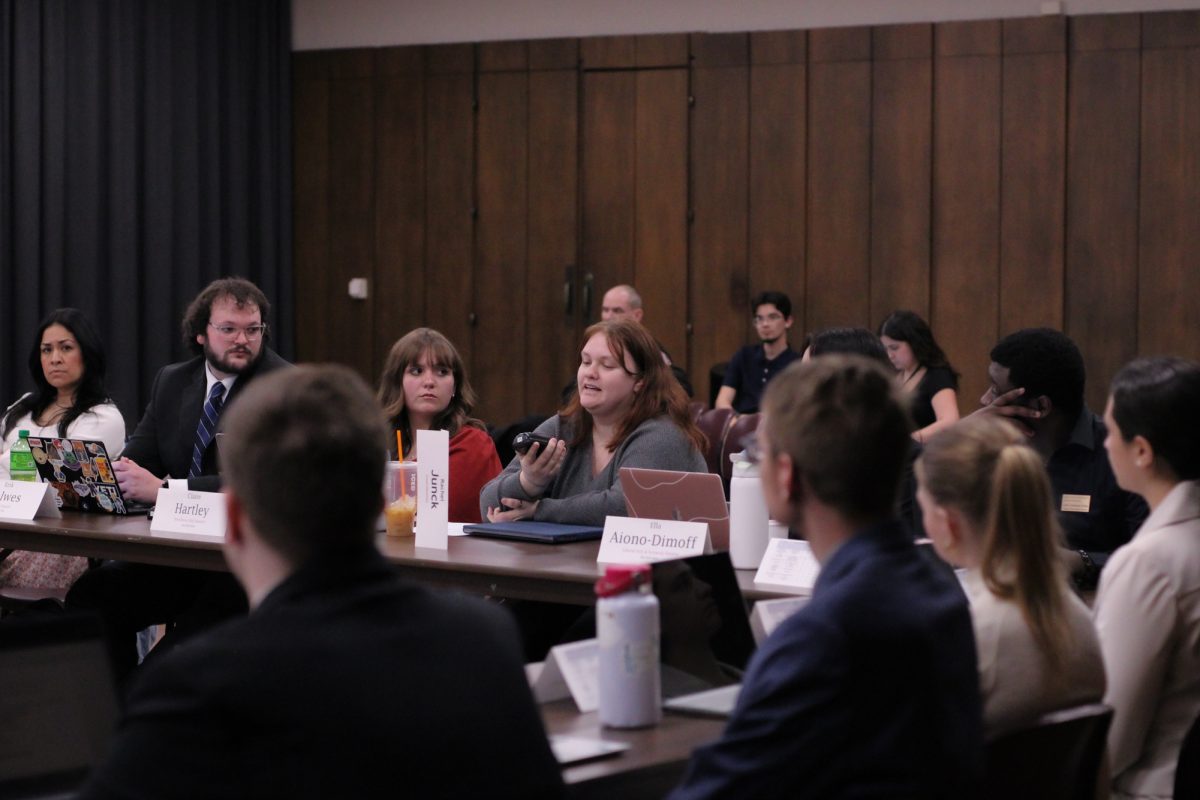Gregg Colburn, an associate professor at the University of Washington, gave a keynote address at the College of Design on Thursday, telling students that the homelessness issue is due to housing-related issues rather than issues like drug use.
Colburn co-authored “Homelessness is a Housing Problem: How Structural Factors Explain U.S. Patterns” with fellow author Clayton Page Aldern in March 2022, a book that discusses the root causes of homelessness and how housing-related problems affect the issue.
Using public data, Colburn analyzed the causes of homelessness, which he argues is due to housing being more scarce and expensive rather than factors such as mental illness or drug use.
“The problem in Washington, Oregon and California is not that we have disproportionate numbers of people who are using drugs,” Colburn said. “Are there people using drugs? Of course there are. There are people using drugs in Chicago too, and then when people get really angry at me and say, ‘Gregg, this is a drug problem. I just saw Joe on the street; there’s a needle next to him.’ I’ll say, ‘You’re right. Drugs are certainly an important part of the story.’”
Colburn said he does not believe drugs can be the problem and cited West Virginia, a state labeled the “home of the opioid epidemic in the United States.”
“It has ravaged that state. One of the consequences of those tragedies is not huge rates of homelessness,” Colburn said.
Colburn said there are countless ways someone could become homeless, from someone leaving a domestic violence situation, making poor decisions, or getting into a fight with a roommate and getting kicked out.
“I’m outraged that in the wealthiest nation in the history of this planet that we allow homelessness. I fundamentally believe one of the reasons why I like studying homelessness is I firmly believe that we can end homelessness in my lifetime,” Colburn said.
Colburn said the people who will lose are the most vulnerable, typically those who are poor and have been discriminated against, addicted, mentally ill or physically disabled.
“Imagine ten friends coming together to play a game of musical chairs. There’s a leader there who starts playing music; they walk around in the circle, [and] the leader pulls one chair out,” Colburn said. “When the music stops, everyone scrambles for a chair, and by definition, someone loses. In this case, it’s Mike, who was on crutches after spraining his ankle.”
Colburn argued that diagnosing homelessness as a problem of the individual will hurt efforts to prevent and stop the issue. He also said the country needs a structural understanding and response to homelessness.
Ava Miller, a junior in civil engineering, said she takes classes to learn about the impacts of homelessness.
“We talk about homelessness and how that can affect a city. A lot of lectures [in my classes] are about how homelessness is a real problem and how they’re working to solve it,” Miller said.
Miller also added that homelessness should be kept top of mind when building housing.
“There are not enough houses for everybody, and houses are becoming so unaffordable,” Miller said. “I think in the future we are going to have to [build] more apartments and create more dense cities and get people out of the suburbs or create more affordable housing to help people transition to be able to afford a house or better apartment. I think it needs to be kept in mind, especially when it comes to planning.”
Angie Arthur, the executive director of Homeward, a Polk County-based homelessness planning organization, said 29% of individuals experiencing homelessness in Iowa are under 18 years of age. She added that people of color are disproportionately affected in Iowa, as they make up nearly 44% of the homeless population but represent only 12% of the state’s population.
“In the end, we’re talking about people,” Arthur said. “A lot of folks have complex issues. I just wanted you all to know that a lot of work is being done within the state to address homelessness because it’s imperative that people understand that the lack of affordable housing is because of widespread systematic causes.”














Chris J | Apr 19, 2024 at 8:57 am
If you can’t bootstrap your way out of disability, illness, joblessness or any other of of life’s unpredictability (like homelessness), then you are not a true American. /satire
Rhondi Ewing | Apr 19, 2024 at 7:10 am
This may be the case for some homeless, but many of them cannot cope with the responsibility of maintaining a household. You would have to take away their freedom and force them to live in a managed situation. If left to run their own household it would be a place of squalor. I had a classmate who became homeless and I know that many of these people are in a fragile mental state. Homelessness is dangerous but they seem to prefer it over rules and obligations. There are no easy answers, for sure.